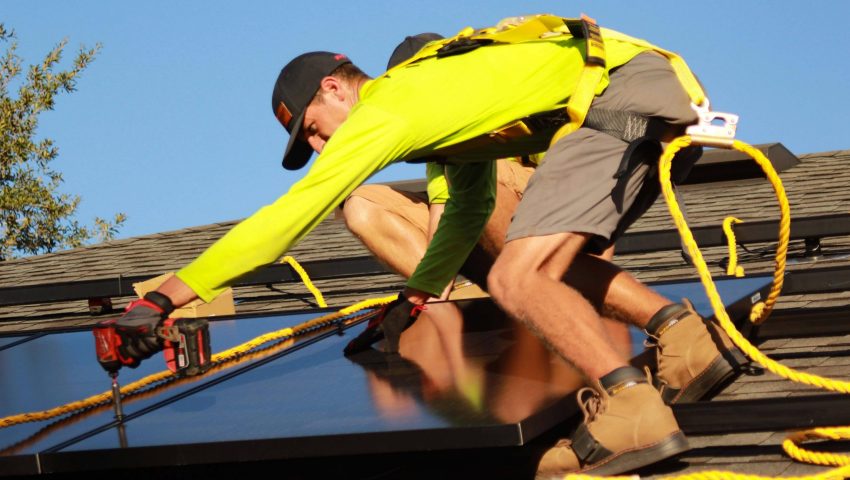Solar energy is becoming an increasingly popular way to generate electricity, and for good reason. It’s a renewable resource that doesn’t produce emissions like traditional power sources. But can solar panels be used to power air conditioners? The answer is yes, but there are a few things you need to consider first. Let’s dive in.
What Is Solar Power and How Does It Work?
Solar power is a renewable energy source that can be used to generate electricity. Rooftop solar panels, which are made up of solar cells, absorb sunlight and convert it into electrical energy through the photovoltaic effect. An inverter converts the DC power current from the solar panel into an AC current, which can be used to power homes in real-time or stored in a battery bank.
How Does a Solar Panel System Run an Air Conditioner or Other Home Appliances?
To run an air conditioner on solar, the solar panels must be able to generate enough electricity to meet the appliance’s energy needs. For most solar-powered air conditioners, this means that the panels must be able to generate at least 3,000 watts of power per hour.
According to Forbes in May 2022, “The latest and best solar panels for residential properties produce between 250 and 400 Watts of electricity. […] The roof size and condition, hours of peak sunlight exposure, and the number of panels in the system determine how much electricity is generated. A typical American household would need around 10,000 KwH per year.”
Therefore, in conjunction with the rest of the home needs, the size of the air conditioning unit and the efficiency of the panels could require a solar power system to have as many as 30 panels.
Solar professionals can help homeowners evaluate how much energy their home uses to determine how many panels they need to offset that energy usage year-round – from the summer air conditioner to the winter heater.
Are There Any Benefits to Using Solar-Powered Air Conditioning Systems Over Traditionally Powered A/C Units?
Solar-powered air conditioning systems have a few advantages over traditional air conditioning units. For one, solar panels enable homeowners to utilize their air conditioning in case of a power outage or within an off-grid system.
Secondly, using less traditional power produces fewer greenhouse gas emissions. This is helpful because a central air conditioning system is one of the largest consumers of electricity in a home and is responsible for a significant amount of residential emissions.
Finally, a solar panel system is typically eligible for government incentives and tax breaks, making them more affordable in the long run. With proper planning and installation, solar-powered air conditioners can keep homes cool and comfortable without contributing to pollution or damaging the environment.
How Much Do Solar Panels Cost?
Home size and energy consumption determine how many solar panels you need and, consequently, their end cost. Colorado homeowners can either pay for the whole thing upfront, finance their installation, or take a solar lease. The average costs of solar panel installations start between $20,000 and $40,000. Depending on the requirements, particular home sizes and electrical needs can cost more.
Though a solar electricity system may have a higher upfront cost, it can offer significant savings over time and require little to no maintenance once installed. The only maintenance that may be required is periodic cleaning of the panels to prevent debris from blocking the sun’s energy from reaching the photovoltaic cells.
What Are the Installation Requirements?
The primary installation requirement for solar panels is direct sunlight. Additional electric and plumbing permits may be required, dependent upon the extent of the project past the AC unit.
A solar professional will also walk homeowners through the decisions on solar batteries. These can be used to store excess electricity generated by the solar panels to run the air conditioner or other appliances when needed.
Learn Why Solar by Peak to Peak is the Premier Solar Panel Provider in Colorado
So, can solar power run an air conditioner? The answer is, most of the time – yes! With over 300 days of sun in Colorado, your home probably has more than enough light to significantly reduce the use of bought electricity.
Solar powering your air conditioners have a few advantages over traditionally powered A/C units, such as utilizing your air conditioner during a power outage, producing less greenhouse gas emissions, and often being eligible for government incentives and tax breaks. In addition, solar panels costs have come down in recent years, and with proper installation, they can last 20-30 years
To learn more about the condition of your roof and it’s capabilities for solar, get a free evaluation Peak to Peak Roofing and Exteriors today!

